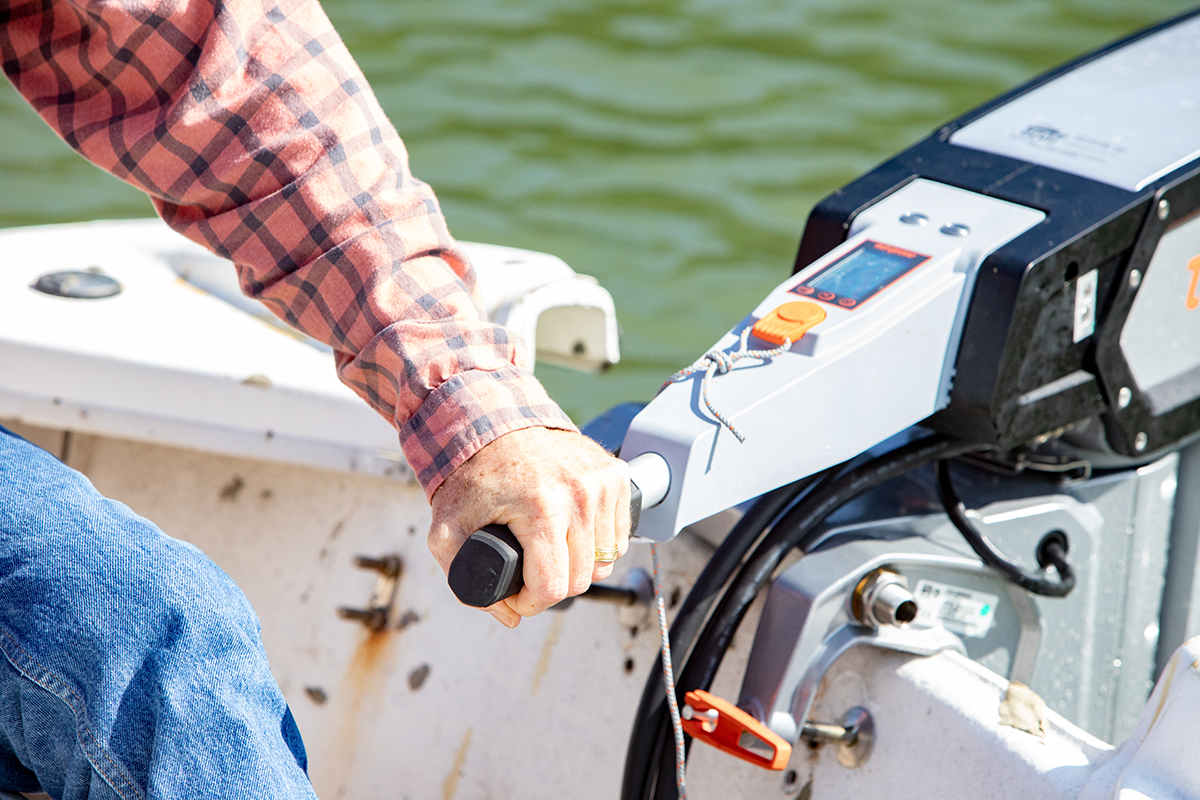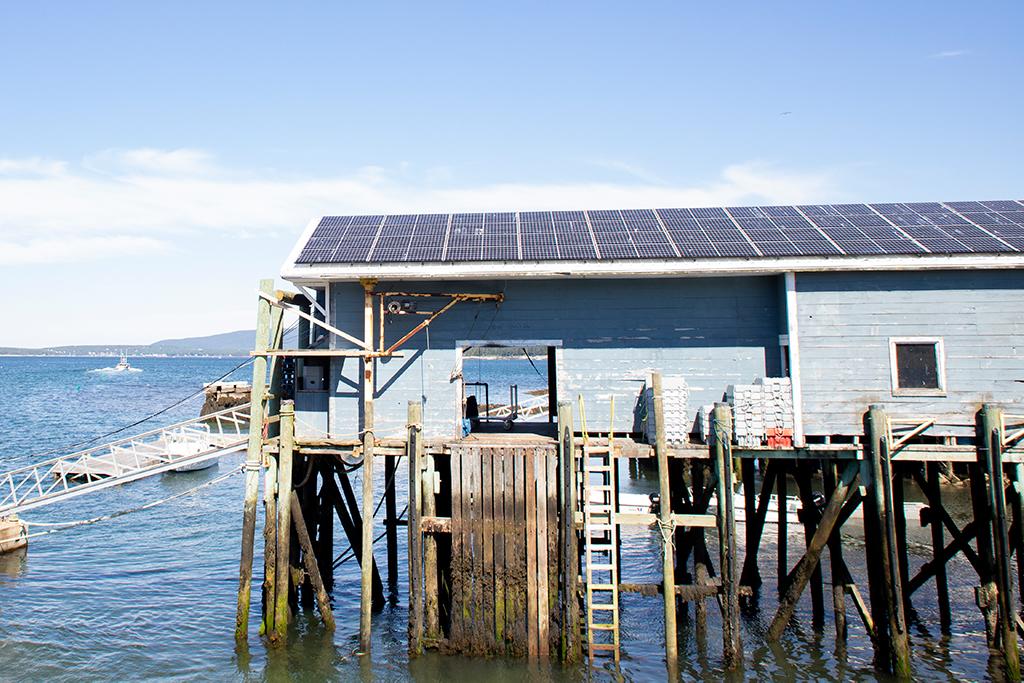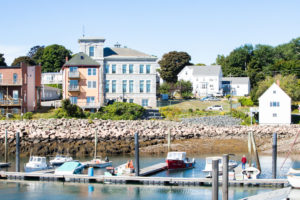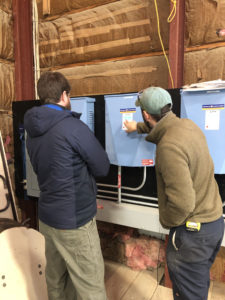Clean energy solutions are a “win-win” for island and coastal communities, both at home and at work. They stabilize energy costs and reduce carbon released into the atmosphere. Island Institute is working on a number of fronts to advance clean energy projects on our coast.

Electrifying Maine’s Working Waterfront
Island Institute is prioritizing the electrification of Maine’s working waterfront. By electrifying the boats, wharves, and businesses on the coast, we’re aiming to reduce greenhouse gas emissions and make Maine’s marine economy stronger and more resilient.
We see this effort as a climate adaptation strategy—to reduce and flatten operating costs of fishing and lobstering to make these industries more economically viable—particularly with added costs and loss of income resulting from climate change and other impacts.
Our clean energy projects on islands and in communities will continue while we focus on these new efforts at the intersection of climate solutions and Maine’s working waterfront. As we build off of our partnership with Luke’s Lobster, the Island Institute is leading the state in climate action in this space (including a new report on the greenhouse gas emissions of Luke’s Lobster’s supply chain), and we are excited about what this work will mean for the future of our coast.

Our current goals and priorities in this space include:
- Putting at least 100 electric outboard motors on skiffs through partnerships with new business ventures, local fishermen, and aquaculturists. Part of this work includes the development and launch of the Electric Boat Course.
- Installing solar-powered charging stations on docks and wharves.
- Providing Spark! grants to fund clean energy projects for fishermen and women, for marine-based businesses, and businesses critical to sustaining our working waterfront.
- Incentivizing Mainers who work on the waterfront to use electric vehicles for transporting their products.
To learn more about our work in this area, review our electric boat demonstration pager.
Spark! Grants
Island Institute provides grant and loan support for broadband, energy, sea level rise, and working waterfront infrastructure planning projects through our Community Impact Fund.
Spark! Grants fund working waterfront energy projects that improve energy efficiency, switch to renewable energy, and/or reduce consumption of fossil fuels. We are currently prioritizing applications to fund working waterfront projects for shoreside charging infrastructure, shoreside renewable energy generation, marine electrification, energy efficiency, and weatherization, but other projects may be considered on a case-by-case basis. Highly visible projects within the community or marine sector that have high environmental and financial benefits are more likely to receive funding.
Applicants can receive up to $4,000 per fiscal year (July–June). If you are seeking funding above this amount, we would love to have a conversation with you about other available funding mechanisms or opportunities. 50% match of funding is required for for-profit businesses, but Island Institute may waive this based on financial need or new technology applications.
What can spark! funds be used for?
The possibilities are endless! We encourage applications for working waterfront projects that improve energy efficiency, focus on renewable energy, and/ or reduce the consumption of fossil fuels. Projects with environmental and financial benefits and educational outreach are more likely to receive funding.
Learn more about Spark! Grants here, and contact us with any questions. To check if we are currently accepting applications and to apply, please visit our Grants and Scholarships Portal.
Community Renewable Energy
Island Institute’s networked approach to energy solutions has helped Maine’s island and coastal communities better understand their unique energy challenges and transition them to clean energy systems. For the last 12 years, we have worked to reduce the high economic and environmental costs of energy use for homeowners, businesses, and municipalities through community-based, nationally-relevant models that increase energy efficiency and renewable energy options.
Through our work over the last decade and our collaborations with communities in Maine, New England, and across the globe, we’ve learned that by bringing the right ideas and partners to the table we can help address the very real needs and common challenges we all share.

Energy Technology Innovation Partnership Project
Building on this history, we’re now gearing up to help remote coastal communities make their energy systems cleaner, more reliable, and more cost-effective through a new partnership with the National Renewable Energy Laboratory (NREL) and the U.S. Department of Energy (DOE).
This collaboration, the Energy Technology Innovation Partnership Project (ETIPP), will bring top expertise to support the communities of Eastport and Islesboro, along with nine others across the country, with their energy challenges over the next few years. Using best-in-class technical assistance from several national labs, these communities will design locally relevant approaches to increasing their energy resilience.
As with our broader organizational climate solutions work, our approach is to trial approaches with specific audiences and then transfer models to apply along the coast and beyond. Piloting energy resilience projects, including adding battery storage for backup power or more renewables for local generation, is crucial for making progress on both of these fronts. Everyone benefits when we see in practice what exactly it takes—socially, technically, and financially—to make these projects happen in remote and island locations.
Island Institute is supporting this process as the regional partner for the Northeast and is coordinating with local and statewide stakeholders on the Maine projects.
Learn more about the work taking place in Eastport and Islesboro and how our collaboration with communities, partners, and Maine’s Congressional delegation helped to shape this federal program to meet the practical needs of our island communities.
Offshore Wind Power in Maine
Warming seas, ocean acidification, and other negative impacts of climate change are a serious threat to Maine’s coast, our marine economy, and the livelihoods of those who live and work here. Offshore wind power offers strong potential to address the climate crisis, but it also raises complex, polarizing issues about how resources are allocated and decisions are made.
- We support clean energy.
- We support Maine fishermen and the marine economy.
- We are committed to bringing people together to create the best solutions for island and coastal communities and the Gulf of Maine.
Learn more about how we’re engaging on this important issue. Read our full statement here and a recent blog post on this topic.
In May, 2022 Island Institute signed on to a letter requesting that the Bureau of Ocean Energy Management Include a Programmatic Environmental Impact Statement as part of identifying wind energy areas in the Gulf of Maine.
Bridging the Rural Efficiency Gap
Islands and other rural communities throughout the United States pay some of the highest costs for electricity and heating fuel. With such high energy costs, the financial benefits of energy efficiency can be significant, but if you live in one of these rural places, it can be difficult to find financing for energy upgrades or a contractor who will work in your area.
We call these financial and logistical barriers the Rural Efficiency Gap.
The Bridging the Rural Efficiency Gap project is designed to make it easier for residents of rural communities in oil-dependent states like Maine, Alaska, New Hampshire, and Vermont to increase the energy efficiency of their homes and lower their energy bills with the support of well-designed financing programs that work in rural places.
Read our full report and check out “Lowering Energy Costs” in our Solutions Library for case studies and practical information about how residents of rural communities have successfully addressed these common community challenges.


